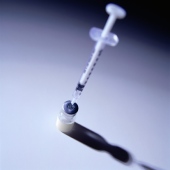
TUESDAY, Sept. 3 (HealthDay News) — An injectable drug that mimics the action of a little-known hormone may hold promise for patients with type 2 diabetes.
The experimental drug, called LY, is a copy of a hormone called fibroblast growth factor 21 (FGF21), and researchers report that it seems to help protect against obesity and may boost the action of insulin.
In a month-long trial of 46 patients with type 2 diabetes who were randomly assigned to receive daily injections of the drug or an inactive placebo, patients who received the highest doses of the drug saw significant, favorable changes in their blood fat (lipid) levels compared to those on the dummy shots. Two “bad” blood fats — LDL and triglycerides — dropped, while patients’ HDL, or “good” cholesterol, increased. Total cholesterol counts also dropped significantly compared to placebo shots.
Patients on the highest doses of the drug also lost a bit of weight, the researchers added.
Insulin and blood sugar levels did dip a bit in patients on the highest doses of the drug, but those changes were not statistically significant compared to patients who were taking the placebo shots, which means they could simply have been a coincidence.
Still, the study authors said they were hopeful that the drug may one day become a useful addition to currently available therapies.
“Our current understanding suggests that FGF21 has the ability to favorably affect body weight, partially normalize abnormal lipid levels in patients with diabetes, and has the potential to improve glycemic control,” said senior study author Dr. Dave Moller, vice president of endocrinology and cardiovascular research, and clinical investigation for Eli Lilly Co., the company that’s developing the drug.
“These are substantial issues and unmet medical needs for patients with obesity and type 2 diabetes,” he added.
The study is published in the Sept. 3 issue of the journal Cell Metabolism.
An endocrinologist who was not involved in the research said the effects of the experimental medication were intriguing.
“There are some interesting properties here that longer studies and bigger numbers will need to confirm,” said Dr. Ronald Goldberg, a professor of medicine in the Diabetes Research Institute at the University of Miami’s Miller School of Medicine. “This is early days for this new medication.”
Goldberg said a longer study would be needed to see if the changes in blood fat levels and weight amounted to real benefits for patients with diabetes, such as a reduction in heart attacks or other complications of the disease.
So far, other drugs that raise good cholesterol and lower triglycerides have not demonstrated real benefits for patients.
And side effects could be a concern. Even though the study was short, there were some signs that the medication might not be well-tolerated, the report indicated.
One patient on the highest dose of the drug developed a serious allergic reaction to the medication including a drop in blood pressure, itching and hives, and had to be treated with corticosteroids and antihistamines.
While no other serious allergic reactions were reported, more than 80 percent of patients on the two highest doses of the drug developed antibodies to the protein, a sign that their body recognized the drug as foreign and was mounting an immune reaction against it, something that might diminish the effectiveness of the medication over time.
“That’s definitely an issue,” Goldberg said, adding that he thought scientists would probably try to tweak the drug to make it less likely to spur immune reactions.
More information
For more on cholesterol and diabetes, visit the American Heart Association.
Copyright © 2026 HealthDay. All rights reserved.

